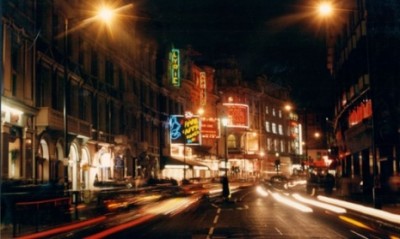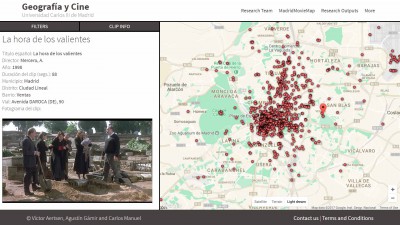
“Geografía y cine” compiles a varied series of works produced by a group of researchers from the Universidad Carlos III de Madrid, interested in the study of relations between the geographical and filmic space. Particular attention is given, on the one hand, to the way the film uses the geographical space as support for shooting locations and, secondly, to the subsequent dissemination of images from the exhibition of films. That is why mapping these filming locations is an essential step for any analytical study. A task that this group of researchers is carrying out in recent years and that, in the case of the Autonomous Community of Madrid, is displayed through an interactive map called MadridMovieMap.
Madrid Movie Map
Film, Space & Place Posted on 18 Jan, 2017 11:03:32- Comments(0) https://ofspacesinbetween.liminoids.com/?p=102
- Share
Voicing Experience – Autoethnography conference
Conference CFPs Posted on 18 Jan, 2017 10:46:00Voicing Experience:
The 4th British Conference of Autoethnography
15-16 June, 2017, University of Sussex, Brighton
This interdisciplinary conference aims to provide an open,
creative space in which to explore the power of autoethnographic work as
expressed through its heterogeneous practices, productions and performances.
What happens when we begin to take our experiences of the worlds we inhabit
seriously and to give reflexive and diffractive voice, through manifold
creative means, to that experience? What resonances do we find with other
narratives and voices articulating experiences from other spheres? How does
voicing experience speak to and challenge the larger structures within which we
live? And how do these different spheres shape, in turn, the quality and style
of voices being expressed – their tone, mode of expression, fluency and
persuasiveness?
The conference seeks to explore the power of
autoethnographic work, as expressed, for instance, in dynamics of resistance,
critique, healing or assistance.
We invite proposals for papers, presentations, performances
and other creative works.
Please submit proposals with abstract (250 words) and, if
relevant, session plan (max 250 words) to voicingexperience2017@sussex.ac.uk<mailto:voicingexperience2017@sussex.ac.uk>
by 10th February 2017.
The presentations will be arranged in the following ways:
· 90-minute
3-person presentation sessions.
· 90-minute
single presentation sessions.
Please indicate which presentation format you would prefer.
Conference fee for this 2-day event (excluding
accommodation): £75
We have a limited number of reduced-rate tickets (£45) for
students and unemployed.
For general enquiries, please write to: voicingexperience2017@sussex.ac.uk<mailto:voicingexperience2017@sussex.ac.uk>
Please see the website for full details and registration: http://www.sussex.ac.uk/sociology/outreach/sociology-conferences/voicingexperience
Organising Committee: Dr Jamie Barnes (Sociology, Sussex),
Dr Michael Hayler (Education, Brighton), Dr Ross Wignall (Anthropology,
Sussex).
This Conference is initiated by Brighton Autoethnography
Group with sponsorship & support from the Departments of Anthropology and
Sociology, University of Sussex.
- Comments(0) https://ofspacesinbetween.liminoids.com/?p=101
- Share
Cinemagoing, Film Experience and Memory
Memory & Heritage Posted on 18 Jan, 2017 10:41:49 Memory Studies Special Issue: Cinemagoing, Film Experience and Memory
Volume 10, Issue 1, January 2017
Annette Kuhn, Daniel Biltereyst and Philippe Meers (issue editors)
http://journals.sagepub.com/toc/mssa/10/1/
Contents
Introduction
Annette Kuhn, Daniel Biltereyst and Philippe Meers
Memories of cinemagoing and film experience: An introduction
Jacqueline Maingard
Cinemagoing in District Six, Cape Town, 1920s to 1960s: History,
politics, memory
José Carlos Lozano
Film at the border: Memories of cinemagoing in Laredo, Texas
Lucie Česálková
‘Feel the film’: Film projectionists and professional memory
Pierluigi Ercole, Daniela Treveri Gennari and Catherine O’Rawe
Mapping cinema memories: Emotional geographies of cinemagoing in Rome in the
1950s
Melvyn Stokes and Matthew Jones
Windows on the world: Memories of European cinema in 1960s Britain
Reviews
‘Film Culture: Brno, 1945 – 1970.’ The History of Distribution,
Reception and Exhibition, Reviewed by Alice Lovejoy
John Seamon, /Memory and Movies: What Films Can Teach Us about Memory/,
Reviewed by Ian O’Loughlin
CarrieLynn Reinhard and Christopher Olson (eds.), /Making Sense of
Cinema: Empirical Studies into Film Spectators and Spectatorship/,
Reviewed byEmma Pett
Karina Aveyard,/The Lure of the Big Screen: Cinema in Rural Australia
and the United Kingdom/, Reviewed by Julia Bohlmann
Marcia Landy, /Cinema and Counter-History/, Reviewed by Mélisande
Leventopoulos
- Comments(0) https://ofspacesinbetween.liminoids.com/?p=100
- Share
Archiving the City
Conference CFPs Posted on 18 Jan, 2017 10:37:43Archiving the City/ City as Archive
Thursday 16 March 2017, 9.00am to 6.00pm
A symposium organised by the Archiving the City research strand.
We are inviting abstract submissions for a one-day symposium entitled Archiving the City/ City as Archive. This event, hosted by the Centre for Modern Studies, considers the cultural forms through which the modern city is archived. It examines the different ways—via institutions, public art, collective practice, and more—in which urban history and memory are organised and presented in contemporary culture. It also engages with how the spaces and architecture of the city may themselves present an archive, offering up reminders of social and cultural processes, imaginaries, struggles and events.
The symposium critically engages with Henri Lefebvre’s (2014) argument that the reign of the city is ending; that the city now only exists as an image and an idea. In addition, the gentrification and museification of the historic urban core reveals, at least in part, the deep sense of loss through which that the modern metropolis is increasingly remembered. This connects more broadly with Derrida’s (1996) notion of ‘archive fever’, which, he understands, is part of a compulsive, repetitive culture; a ‘homesickness’ born of a ‘nostalgic desire to return to the origin’ (ibid: 167). As such, the symposium is interested in perspectives that make links between contemporary archiving processes (both formal and informal), city museums, visual culture, heritage urbanism, ‘authenticity’ and the cultural regeneration of historic urban spaces. Particularly welcome are proposals that critically examine the ways in which the city is archived to create the impression of a post-conflictual present or in ways that make the city a more exclusive or restricted place. In addition, we welcome abstracts that explore how archiving the city can, in ways reminiscent of Benjamin’s Arcades Project, reveal the immediacy and fragmentary nature of metropolitan experience. The symposium will take an open-minded and critical approach to understanding how, why and where the modern city is archived and what such processes reveal about history, memory, social conflict and urban imaginaries.
Abstracts of no longer than 250 words to be sent to gareth.millington@york.ac.uk by 5pm on Friday January 6th. We especially welcome abstracts from postgraduate and doctoral students.
Confirmed external speakers include Rebecca Madgin (University of Glasgow) and Graeme Gilloch (University of Lancaster).
Registration for University of York staff and students is free. Please book your place here: http://store.york.ac.uk/product-catalogue/centre-for-modern-studies/conferences
References
Derrida, J. (1996) Archive Fever: A Freudian Impression. Chicago: Chicago University Press
Lefebvre, H. (2014) ‘Dissolving city, planetary metamorphosis’, Environment and Planning D: Society and Space 32: 199-202
Location: The Treehouse, Berrick Saul Building
Email: gareth.millington@york.ac.uk
- Comments(0) https://ofspacesinbetween.liminoids.com/?p=99
- Share
CFP: Media’s Mapping Impulse
Conference CFPs Posted on 14 Aug, 2015 15:46:30Media’s Mapping Impulse
Cartography
is one of the oldest forms of media. In both cartography and media,
meaning, ideology, and power are habitually arbitrated across and
through space and time. While critical cartographers
have shed light on mapping’s innate tendency toward the objectification
of spatial relations, a (masculine) gaze that it cannot disown, these
same power relations are equally embedded in media’s voyeuristic and
controlling tendencies. Media, moreover, in
all its diverse forms, has an underlying mapping impulse – a proclivity
to comprehend itself and be rendered comprehensible through metaphors
of topologies, networks, and flows that lead to the constant evacuation
of spaces in order to produce places of communication.
This mapping impulse is hardly new, but rather has been part of media
all along. Visual media, for instance, developed out of a mapping
impulse during the Renaissance, which led to the scopic regimes of
projectionism and perspectivalism and their related
technologies. Both media and cartography are never static, but rather
are ongoing scopic and discursive regimes that continually make and
remake the terms in which we understand and interact with our world.
And yet,
the mapping impulse of media is both overt and subtle. Think, for
instance, of the subtle duplicity of Hollywood’s runaway productions,
which creatively map Toronto as the “other” New
York, Romania as North Carolina, or South Africa as California.
Developments in mobile computing have not only increased the pace, flow,
and interaction of media across space, but also the ubiquity, and thus
the taken-for-grantedness, of mapping. More and
more, owing to the practices of the neogeographers of the Geoweb, media
requires a geographical situatedness in which and for which media can
take place. Here, locative media relies on programming languages and
APIs to construct geo-fencing, geo-tagging,
and geo-coding and to produce applications and services that localize
and individualize information to one’s liminal, transitory, and fleeting
lived space. Consider, for example, the ways in which (geo)web 2.0
unites one’s virtual and physical presence (if
such a distinction can be made) via services such as FourSquare or
Facebook check-ins that announce one’s whereabouts to friends and
acquaintances.
With this
collection of papers we seek to illuminate media’s mapping impulse by
exploring the relationship between cartography, geospatial technologies,
and locative media on the one hand, and new
and traditional media forms such as social media, mobile apps,
television, film, and music, on the other.
Media’s Mapping Impulse will be an international and
interdisciplinary gathering of essays to be printed in the acclaimed
Media Geography at Mainz (MGM) book series (www.geo.uni-mainz.de/mgm).
Possible themes
and areas of focus for this book include, but are not limited to:
montage and bricolage; the cartographic paradox and cartographic
anxiety; the spatial turn in media studies; GIS as media and the use of
GIS to understand media; sensorial cartographies, sound
and musical maps; cinematic cartographies; locative media, mobile apps,
and the everyday; sharing economies (AirBnB, Couch Surfing, Uber) and
the map; architectonics, spatial mobilities, haptical and emotional
cartographies; urban planning, media and the revisualization
of place.
Those
interested in participating should send an extended abstract (750-1,000
words), along with a curriculum vitae and contact information, to Laura
Sharp (laurasharp@email.arizona.edu)
with the subject line “Media’s Mapping Impulse.” We ask that all proposals be submitted on or before
September 15th, 2015. Responses to these proposals will be returned by
November 1st, 2015. If selected, full papers will be expected on or before
March 31, 2015. A blind review will be conducted on all papers. Final papers will be due no later than
June 1, 2016. All authors selected for the final collection will
be welcome to attend the “Media’s Mapping Impulse” symposium to be held
at the
Institute of Geography at the Johannes Gutenberg-University of Mainz in June 2016.
- Comments(0) https://ofspacesinbetween.liminoids.com/?p=98
- Share
New Book: Digital Cities
Digital Spaces Posted on 14 Aug, 2015 15:43:26 Digital Cities: The Interdisciplinary Future of the Urban Geo-Humanities
Benjamin Fraser (Palgrave Pivot, 2015)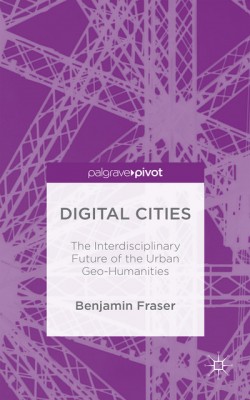
Digital Cities stakes claim to an interdisciplinary terrain where the humanities and social sciences combine with digital methods. Part I: Layers of the Interdisciplinary City converts a century of urban thinking into concise insights destined for digital application. Part II: Disciplinary/Digital Debates and the Urban Phenomenon delves into the bumpy history and uneven present landscape of interdisciplinary collaboration as they relate to digital urban projects. Part III: Toward a Theory of Digital Cities harnesses Henri Lefebvre’s capacious urban thinking and articulation of urban ‘levels’ to showcase where ‘deep maps’ and ‘thick mapping’ might take us. Benjamin Fraser argues that while disciplinary frictions still condition the potential of digital projects, the nature of the urban phenomenon pushes us toward an interdisciplinary and digital future where the primacy of cities is assured.
- Comments(0) https://ofspacesinbetween.liminoids.com/?p=97
- Share
New Book: Locative Social Media: Place in the Digital Age
Digital Spaces Posted on 14 Aug, 2015 15:38:51 Locative Social Media: Place in the Digital Age
Leighton Evans (Palgrave, 2015)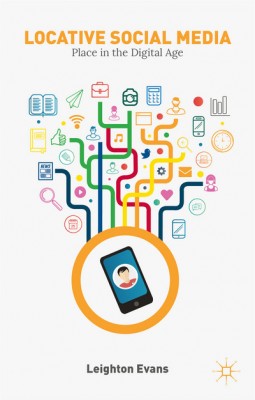
Locative Social Media offers a critical analysis of the effect of using locative social media on the perceptions and phenomenal experience of lived in spaces and places. It includes a comprehensive overview of the historical development of traditional mapping and global positioning technology to smartphone-based application services that incorporate social networking features as a series of modes of understanding place. Drawing on users accounts of the location-based social network Foursquare, a digital post-phenomenology of place is developed to explain how place is mediated in the digital age. This draws upon both the phenomenology of Martin Heidegger and post-phenomenology to encompass the materiality and computationality of the smartphone. The functioning and surfacing of place by the device and application, along with the orientation of the user, allows for a particular experiencing of place when using locative social media termed attunement, in contrast to an instrumentalist conception of place.
- Comments(0) https://ofspacesinbetween.liminoids.com/?p=96
- Share
New Book: Cartographies of Place: Navigating the Urban
Maps & Mapping Posted on 14 Aug, 2015 15:35:14 Cartographies of Place: Navigating the Urban
Edited by Michael Darroch and Janine Marchessault
(McGill-Queen’s University Press, 2015)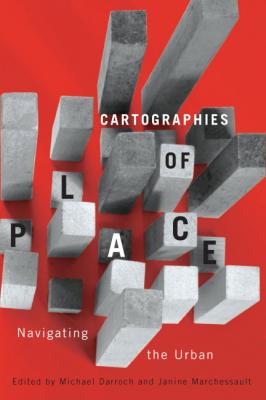
Media are incorporated into our physical environments more dramatically than ever before – literally opening up new spaces of interactivity and connection that transform the experience of being in the city. Public gatherings and movement, even the capabilities of democratic ideology, have been redefined. Urban Screens, mobile media, new digital mappings, and ambient and pervasive media have all created new ecologies in cities. How do we analyze these new spaces? Recognition of the mutual histories and research programs of urban and media studies is only the beginning. Cartographies of Place develops new vocabularies and methodologies for engaging with the distinctive situations and experiences created by media technologies which are reshaping, augmenting, and expanding urban spaces. The book builds upon the rich traditions and insights of a post-war generation of humanist scholars, media theorists, and urban planners. Authors engage with different historical and contemporary currents in urban studies which share a common concern for media forms, either as research tools or as the means for discerning the expressive nature of city spaces around the world. All of the media considered here are not simply “free floating,” but are deeply embedded in the geopolitical, economic, and material contexts in which they are used. Cartographies of Place is exemplary of a new direction in interdisciplinary media scholarship, opening up new ways of studying the complexities of cities and urban media in a global context.
- Comments(0) https://ofspacesinbetween.liminoids.com/?p=95
- Share
Inside the Digital Humanities: Digital Mapping
Digital Spaces Posted on 14 Aug, 2015 15:29:58Introductory blog on digital mapping…
https://humdigi.wordpress.com/2015/05/02/inside-the-digital-humanities-digital-mapping/
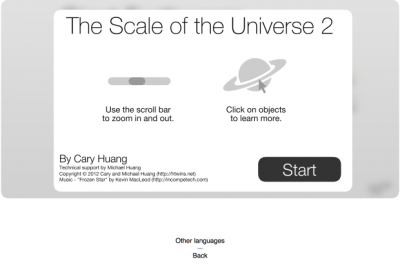
As it was described in the last post, Digital Humanities is, in short terms, much more than computational processing data. It is about designing new ways of scholarship, with infinite potentialities and always open to new possibilities and new worlds.
From now on, lets talk about some ramifications inside the Digital Humanities. The topic of today will be Digital Mapping!…
- Comments(0) https://ofspacesinbetween.liminoids.com/?p=94
- Share
Henri Lefebvre – reading guide
Cities & Space Posted on 29 May, 2015 09:50:12Stuart Elden has put together a very useful beginner’s guide to Henri Lefebvre which I’ve re-posted below from his Progressive Geographies blog:
- Comments(0) https://ofspacesinbetween.liminoids.com/?p=93
- Share
What Happens When Digital Cities Are Abandoned?
Cities & Space Posted on 30 Mar, 2015 17:17:25What Happens When Digital Cities Are Abandoned? Exploring the pristine ruins of Second Life and other online spaces
Laura E. Hall, The Atlantic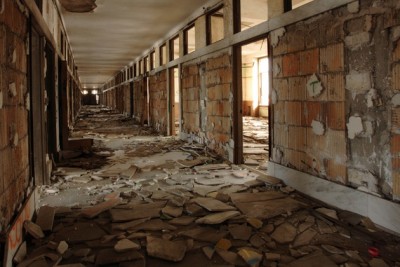
The Atlantic, 13 July 2014
- Comments(0) https://ofspacesinbetween.liminoids.com/?p=92
- Share
New Book – Co-habiting with Ghosts Knowledge, Experience, Belief and the Domestic Uncanny
Memory & Heritage Posted on 30 Mar, 2015 17:12:26Co-habiting with Ghosts: Knowledge, Experience,
Belief and the Domestic Uncanny
Caron Lipman (Ashgate, 2014)
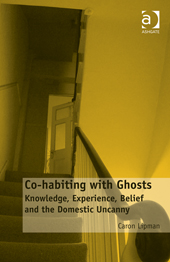 How does it feel to
How does it feel to
live in a ‘haunted home’? How do people negotiate their everyday lives with the
experience of uncanny, anomalous or strange events within the domestic
interior? What do such experiences reveal of the intersection between the
material, immaterial and temporal within the home? How do people interpret,
share and narrate experiences which are uncertain and unpredictable? What does
this reveal about contested beliefs and different forms of knowledge? And about
how people ‘co-habit’ with ghosts, a distinctive self – other relationship
within such close quarters?
This book sets out to explore these questions. It applies a non-reductive
middle-ground approach which steers beyond an uncritical exploration of supernatural
experiences without explaining them away by recourse only to wider social and
cultural contexts. The book attends to the ways in which households in England
and Wales understand their experience of haunting in relation to ideas of
subjectivity, gender, materiality, memory, knowledge and belief. It explores
home as a place both dynamic and differentiated, illuminating the complexity of
‘everyday’ experience – the familiarity of the strange as well as the
strangeness of the familiar – and the ways in which home continues to be
configured as a distinctive space.
Contents: Approaching
the ghost. Part I Spaces and Times of the Haunted Home: The material uncanny;
The temporalities of the haunted home. Part II Strategies of Cohabitation:
Embodying, domesticating, gendering the ghost; Strategies of distance and
communication. Part III Belief, Knowledge and Experience: Knowledge and
uncertainty; Belief, evidence and experience; Conclusion: the liminal
home/self; Appendix: the households; References; Index.
About
the Author: Dr Caron Lipman is Research Fellow at
the School of Geography, University of London, UK.
Reviews: ‘Most people have heard of ghosts: popular culture
is full of them. Many people will know of someone who has seen a ghost or had a
ghostly experience. Sometimes, people feel haunted, whether by tragedy or by a
sense of loss. But, for a few, paranormal activity is normal activity. People
do not just live with ghosts as a cultural or metaphorical or emotional figure:
they actually live with ghosts. In this extraordinary book, Caron Lipman deals
with extraordinary phenomena in ordinary life, in the home. Rich in testimony,
ever sensitive to people’s experience, she reveals how the people who live with
ghosts learn to accommodate them – and how, consequently, we all deal with
strangers and strangeness in our lives.’
Steve Pile, The Open University, UK
‘What does it mean to share your home with a ghost? Caron Lipman’s answers to
this question are thought-provoking and insightful. Foregrounding people’s own
experiences and beliefs in her exploration of the uncertain boundary between
material and immaterial geographies, she challenges much current thinking about
home and subjectivity in this highly original and beautifully written book.’
Ann Varley, UCL (University College London), UK
‘Large portions of this book, especially the interviews with the experients,
will be of great interest to students of folklore, and should be of interest to
psychical researchers and one often gets the sense that there are important
insights here’. The Magonia Review of Books
Society and Space review: http://societyandspace.com/reviews/reviews-archive/lipman/
- Comments(0) https://ofspacesinbetween.liminoids.com/?p=91
- Share
Classic album covers in Google Street View
Digital Spaces Posted on 30 Mar, 2015 16:59:28From Pink Floyd to PJ Harvey, our Street View specialist shows us the world’s cities through the lens of famous album covers…
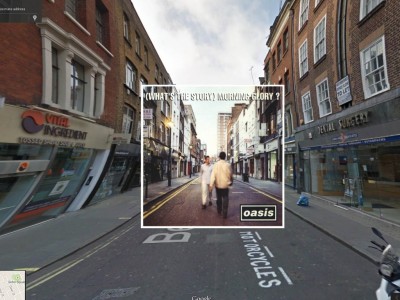
The Guardian, 7 April 2014
- Comments(0) https://ofspacesinbetween.liminoids.com/?p=90
- Share
Guardian article – A lament for the death of bohemian London
Cities & Space Posted on 30 Mar, 2015 16:43:46 A lament for the death of bohemian London
John Harris
The eviction of the 12 Bar Club squatters is just the latest chapter in a devastating saga of politics aligning with business…
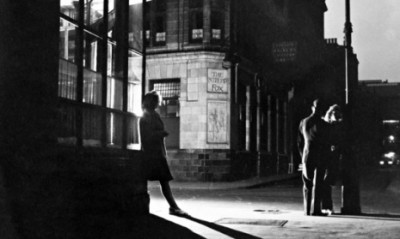
The Guardian, 6 February 2015
- Comments(0) https://ofspacesinbetween.liminoids.com/?p=89
- Share
New Book – Toward an Urban Cultural Studies Henri Lefebvre and the Humanities
Spatial Humanities Posted on 30 Mar, 2015 16:37:03 Toward an Urban Cultural Studies: Henri Lefebvre and the Humanities
Benjamin Fraser
Palgrave Macmillan, 2015. ISBN: 9781137498557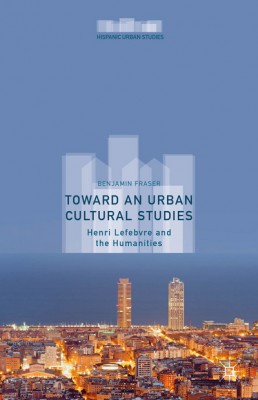 Toward an Urban Cultural Studies is a call for a new interdisciplinary area of research and teaching. Blending Urban Studies and Cultural Studies, this book grounds readers in the extensive theory of the prolific French philosopher Henri Lefebvre. Appropriate for both beginners and specialists, the first half of this book builds from a general introduction to Lefebvre and his methodological contribution toward a focus on the concept of urban alienation and his underexplored theory of the work of art. The second half merges Lefebvrian urban thought with literary studies, film studies and popular music studies, successively, before turning to the videogame and the digital humanities. Benjamin Fraser’s approach consistently emphasizes the interrelationship between cities, culture, and capital.
Toward an Urban Cultural Studies is a call for a new interdisciplinary area of research and teaching. Blending Urban Studies and Cultural Studies, this book grounds readers in the extensive theory of the prolific French philosopher Henri Lefebvre. Appropriate for both beginners and specialists, the first half of this book builds from a general introduction to Lefebvre and his methodological contribution toward a focus on the concept of urban alienation and his underexplored theory of the work of art. The second half merges Lefebvrian urban thought with literary studies, film studies and popular music studies, successively, before turning to the videogame and the digital humanities. Benjamin Fraser’s approach consistently emphasizes the interrelationship between cities, culture, and capital.
- Comments(0) https://ofspacesinbetween.liminoids.com/?p=88
- Share
Cartographica – Special issue – “Deconstructing the Map”: 25 Years On
Maps & Mapping Posted on 30 Mar, 2015 16:32:51Cartographica
Volume 50, Number 1, Spring 2015
Special issue – “Deconstructing the Map”: 25 Years On
Articles to include:
Introduction: The Limits to Deconstructing the Map
Reuben Rose-Redwood
This
special issue marks the twenty-fifth anniversary of the publication of
J.B. Harley’s “Deconstructing the Map” (1989), which has had a major
influence in the fields of critical cartography, the history of
cartography, and human geography more generally. Over the last quarter
century, this essay and related works have also been widely cited by
scholars from a broad range of disciplines across the social sciences
and humanities, serving as a key reference for those seeking to theorize
the spatial politics of maps and mapping. Through such citational
practices, “Deconstructing the Map” has acquired a canonical status as
one of the classics of critical cartographic theory, yet the limitations
of its theoretical and methodological analyses are widely acknowledged
even by Harley’s strongest supporters. The contributors to this special
issue discuss their own critical engagements with this foundational text
as well as the extent to which Harley’s work still resonates with
contemporary perspectives in the field of critical cartography today.
The broader aim of this collection is therefore not to further canonize
Harley as the patron saint of critical cartography but rather to think
through the limits of “Deconstructing the Map” to ensure that current
and future theorizations of the power of mapping remain open to
self-critique and new becomings.
Cartography and Its Discontents
Matthew H. Edney
This Is Not about Old Maps
Denis Wood
“Snapshots of a Moving Target”: Harley/Foucault/Colonialism
Daniel Clayton
Reflections on J.B. Harley’s “Deconstructing the Map”
John Krygier
Harley and Friday Harbor: A Conversation with John Pickles
Jeremy Crampton and Matthew W. Wilson
Reflecting on J.B. Harley’s Influence and What He Missed in “Deconstructing the Map”
Martin Dodge and Chris Perkins
Tracing the Map in the Age of Web 2.0
Wen Lin
Still Deconstructing the Map: Microfinance Mapping and the Visual Politics of Intimate Abstraction
Sarah Elwood
Deconstructing the Map after 25 Years: Furthering Engagements with Social Theory
Leila M. Harris
Looking “beyond” Power: J.B. Harley’s Legacy and the Powers of Cartographic World-Making
Reuben Rose-Redwood
_______________________________________
Cartographica is available online at:
Project MUSE – http://bit.ly/cartopm
- Comments(0) https://ofspacesinbetween.liminoids.com/?p=87
- Share
New Book – Deep Maps and Spatial Narratives
Maps & Mapping Posted on 30 Mar, 2015 16:31:05Deep
Maps and Spatial Narratives
Edited by David J. Bodenhamer, John Corrigan and Trevor M. Harris
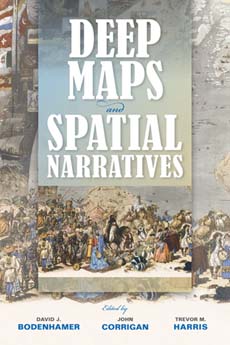
“Deep Maps and Spatial Narratives sets out to describe ‘deep mapping,’ an enhanced environment of data from widely distributed sources used to create a contextual view of a place, a network of social aspects, and environment, as the next step forward in the use of geo-referenced information. It spells out the state-of-the art in the use of new technology in mapping and geo-registration and its ramifications for history, geography, social sciences, cultural studies, environment research, and the humanities. The articles are filled with suggestions and viewpoints that are stimulating [and] the questions raised numerous and complex.”—Lewis Lancaster, University of California Berkeley
Deep maps are finely detailed, multimedia depictions of a place and the people, buildings, objects, flora, and fauna that exist within it and which are inseparable from the activities of everyday life. These depictions may encompass the beliefs, desires, hopes, and fears of residents and help show what ties one place to another. A deep map is a way to engage evidence within its spatio-temporal context and to provide a platform for a spatially-embedded argument. The essays in this book investigate deep mapping and the spatial narratives that stem from it. The authors come from a variety of disciplines: history, religious studies, geography and geographic information science, and computer science. Each applies the concepts of space, time, and place to problems central to an understanding of society and culture, employing deep maps to reveal the confluence of actions and evidence and to trace paths of intellectual exploration by making use of a new creative space that is visual, structurally open, multi-media, and multi-layered.
David Bodenhamer is Executive Director of The Polis Center at IUPUI and Professor of History. He is co-editor (with John Corrigan and Trevor M. Harris) of The Spatial Humanities: GIS and the Future of Humanities Scholarship (IUP, 2010).
John Corrigan is the Lucius Moody Bristol Distinguished Professor of Religion and Professor of History at Florida State University. He has authored or edited numerous books on the history of religion, including
Religion and Space in the Atlantic World (forthcoming).
Trevor M. Harris is Eberly Professor of Geography at West Virginia University. He is one of the early contributors to the GIS and Society critique of spatial technologies.
Indiana University Press
February 2015 256pp 36 b&w illus., 5 maps, 2 tables 9780253015600
£21.99 now only £16.49 when you quote CSL215DEEP when you order.
http://www.combinedacademic.co.uk/deep-maps-and-spatial-narratives
- Comments(0) https://ofspacesinbetween.liminoids.com/?p=86
- Share
New Book – Cultural Mapping and the Digital Sphere
Maps & Mapping Posted on 30 Mar, 2015 16:27:31Cultural Mapping and the Digital Sphere: Place and Space
Ruth Panofsky & Kathleen Kellett, Editors
University of Alberta Press (May 2015) ISBN: 9781772120493
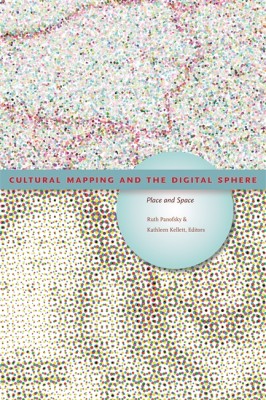
“Notwithstanding their differing approaches—digital, archival, historical, iterative, critical, creative, reflective—the essays gathered here articulate new ways of seeing, investigating, and apprehending literature and culture.” – From the Preface
This collection of fourteen essays enriches digital humanities research by examining various Canadian cultural works and the advances in technologies that facilitate these interdisciplinary collaborations. Fourteen essays in English or French survey the helix of place and space: While contributors to Part 1 chart new archival and storytelling methodologies, those in Part 2 venture forth to explore specific cultural and literary texts. Cultural Mapping and the Digital Sphere will serve as an indispensable road map for researchers and those interested in the digital humanities, women’s writing, and Canadian culture and literature.
http://www.wsupress.wayne.edu/books/detail/cultural-mapping-and-digital-sphere
- Comments(0) https://ofspacesinbetween.liminoids.com/?p=85
- Share
Nightwalking: a subversive stroll through the city streets
Cities & Space Posted on 30 Mar, 2015 16:15:58Nightwalking: a subversive stroll through the city streets
Walking at night has always been the pursuit of the lost, the lonely, the deviant and dispossessed. Yet in today’s cities it can have a rebellious role…
http://www.theguardian.com/books/2015/mar/27/nightwalking-subversive-city-streets-london-matthew-beaumont
- Comments(0) https://ofspacesinbetween.liminoids.com/?p=84
- Share
Literary map of Edinburgh launched
Maps & Mapping Posted on 30 Mar, 2015 16:10:49 Edinburgh’s literary history mapped at the click of a button ‘Lit Long’, a searchable interactive map of the city, will take users to locations made famous by Scottish writers from Walter Scott to Irvine Welsh – and tell you what they wrote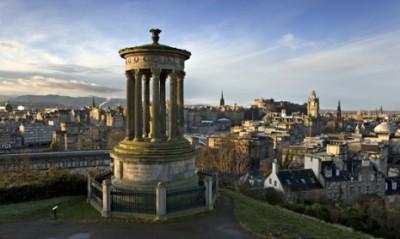
The Guardian, 28 March 2015
- Comments(0) https://ofspacesinbetween.liminoids.com/?p=83
- Share

